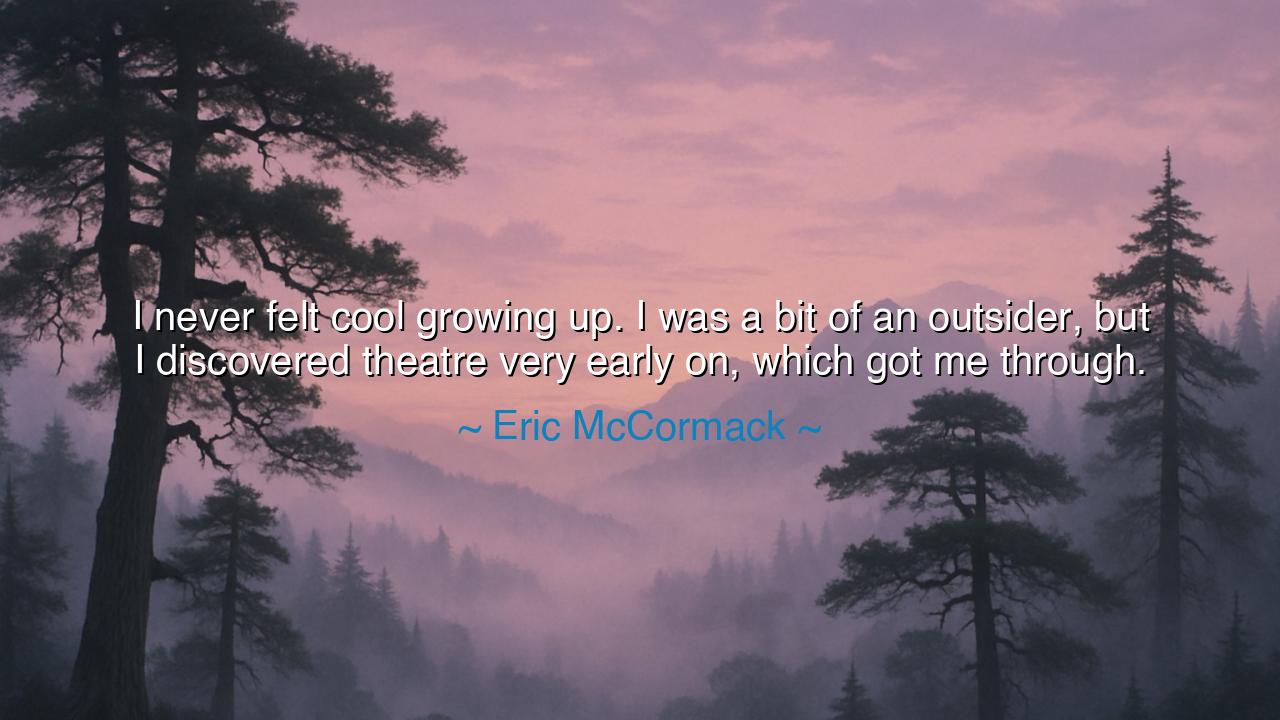
I never felt cool growing up. I was a bit of an outsider, but I
I never felt cool growing up. I was a bit of an outsider, but I discovered theatre very early on, which got me through.






"I never felt cool growing up. I was a bit of an outsider, but I discovered theatre very early on, which got me through." These words, spoken by Eric McCormack, speak to the universal experience of alienation and the search for identity. McCormack’s reflection on his youth reveals that the path to self-acceptance is not always smooth, and for many, it is shaped by a moment or a discovery that gives life meaning. For McCormack, it was the theatre that provided a sense of belonging and purpose, a space where he could express himself freely and feel a sense of connection with the world. The theatre became his refuge, a place where the feeling of being an outsider was transformed into a source of strength and self-discovery.
In the ancient world, the sense of being an outsider was not uncommon, and many found solace in the arts—particularly in theatre, which was a cathartic and transformative experience. Consider the great playwright Sophocles, whose tragedies, like Oedipus Rex, explored the deep inner conflicts of human existence. These works resonated with audiences not just for their dramatic content, but for their ability to tap into the human experience of isolation, identity, and self-awareness. In many ways, theatre in the ancient world offered individuals the opportunity to confront their own struggles, to find meaning in the midst of chaos, and to gain a sense of self-realization through the characters and stories portrayed. Like McCormack, who found a sanctuary in theatre, many individuals in the ancient world found their voice and identity through this powerful medium of expression.
The power of theatre as a tool for personal transformation is also echoed in the story of William Shakespeare, whose works have long been a mirror to the human condition. Shakespeare’s characters, often marked by their internal struggles and journeys of self-discovery, resonated with those who felt like outsiders in society. The stories of Hamlet, Macbeth, and King Lear spoke to universal themes of alienation, self-doubt, and the search for meaning. Shakespeare understood that through performance and the exploration of human emotion, one could transcend the limitations of identity and find connection with others. For many actors and audience members, like McCormack, the theatre provided an avenue to explore and understand their own emotions, transforming what might be perceived as outsider status into a journey toward personal empowerment.
McCormack’s story is particularly relevant because it reflects a timeless truth about the nature of self-discovery: that sometimes, the path to finding belonging and confidence lies in embracing what makes us different. In ancient Greece, Socrates was often seen as an outsider, challenging the norms of society and questioning the beliefs of the powerful. Yet, his philosophical journey ultimately shaped the foundation of Western thought. Socrates’ alienation was not a barrier to his wisdom; rather, it became a source of strength, propelling him toward the pursuit of truth and understanding. Similarly, McCormack’s early feeling of being an outsider was not an impediment to his success; rather, it helped him discover a passion that ultimately became his calling. The experience of being outside the mainstream can often lead to the discovery of our true selves, just as it did for McCormack.
In McCormack’s reflection, we find a lesson that is both emotional and deeply wise: sometimes, our perceived weaknesses or feelings of being an outsider can be the very things that lead us to greatness. The key is to find what nourishes us, what provides us with a sense of purpose, and to embrace it. In McCormack’s case, it was the theatre—a space where he could both explore the lives of others and, in doing so, better understand his own. Just as Socrates found his purpose in philosophy and Shakespeare used his art to give voice to the complexities of human experience, McCormack’s journey reminds us that the things that make us feel like outsiders can also be the catalysts for transformation.
The practical lesson to take from McCormack’s words is the importance of self-discovery through expression, whether it be in the arts, sports, or any other avenue that brings meaning to life. It is crucial to recognize that alienation is not a permanent condition but a phase of growth that can lead to self-empowerment. If we find ourselves in situations where we feel out of place, we must not retreat in despair but seek out the things that nourish and empower us. For McCormack, it was the theatre; for others, it might be art, writing, music, or some other form of self-expression. The key is to embrace our differences, find our calling, and never let the feeling of being an outsider define our journey.
In our own lives, we should not be afraid to embrace the parts of ourselves that might make us feel different or out of place. Like McCormack, we should seek out the spaces where we can express ourselves freely, grow, and ultimately find our purpose. Theatre, in its many forms, offers an excellent metaphor for life: it is through performing, through embracing both the light and shadow of our identities, that we find our true voices. Let us take McCormack’s words as a reminder that authenticity and self-expression are not just avenues to personal fulfillment but also the keys to transforming what once seemed like limitations into sources of strength and growth.






AAdministratorAdministrator
Welcome, honored guests. Please leave a comment, we will respond soon